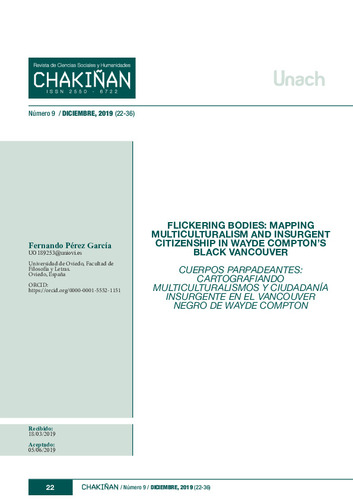Flickering Bodies: Mapping Multiculturalism and Insurgent Citizenship in Wayde Compton’s Black Vancouver
Autor(es) y otros:
Palabra(s) clave:
Black, Vancouver, literature, space, multiculturalism
Negro, Vancouver, literatura, espacio, multiculturalismo
Fecha de publicación:
Citación:
Descripción física:
Resumen:
We live in a moment of hardening of nationalist discourses against immigration and racial minorities. In this conservative climate, Canada prevails as a benchmark for multicultural integration. However, there are voices within the nation that question this image of harmony. The case of the Black Vancouver community has not yet been studied in depth in this regard. This article of reflection aims to contribute to the debate on the relations of the nation-state and subaltern groups, and how they manifest themselves in the multicultural city. Vancouver has been chosen as a paradigmatic space because of its transcultural character built on indigenous lands. The object of study was the literature of Wayde Compton author and black activist of the city. Stemming from theories of the socio-spatial dialectic of Edward Soja and Leonie Sandercock, this article analyses the connection between the city, its representation in literature and its effects on social relationships. The work of Compton and its parallelism with the geo-history of Vancouver and subaltern ethnic communities were analysed. The result reaches a reading of Vancouver as a (post)colonial city and space of subaltern multiculturalism, regarding the official Canadian model, and colonialism that has made invisible to the Black Vancouver and the indigenous communities.
We live in a moment of hardening of nationalist discourses against immigration and racial minorities. In this conservative climate, Canada prevails as a benchmark for multicultural integration. However, there are voices within the nation that question this image of harmony. The case of the Black Vancouver community has not yet been studied in depth in this regard. This article of reflection aims to contribute to the debate on the relations of the nation-state and subaltern groups, and how they manifest themselves in the multicultural city. Vancouver has been chosen as a paradigmatic space because of its transcultural character built on indigenous lands. The object of study was the literature of Wayde Compton author and black activist of the city. Stemming from theories of the socio-spatial dialectic of Edward Soja and Leonie Sandercock, this article analyses the connection between the city, its representation in literature and its effects on social relationships. The work of Compton and its parallelism with the geo-history of Vancouver and subaltern ethnic communities were analysed. The result reaches a reading of Vancouver as a (post)colonial city and space of subaltern multiculturalism, regarding the official Canadian model, and colonialism that has made invisible to the Black Vancouver and the indigenous communities.
ISSN:
Colecciones
- Artículos [37548]
- Filología Inglesa, Francesa y Alemana [591]
- Investigaciones y Documentos OpenAIRE [8420]
Ficheros en el ítem





